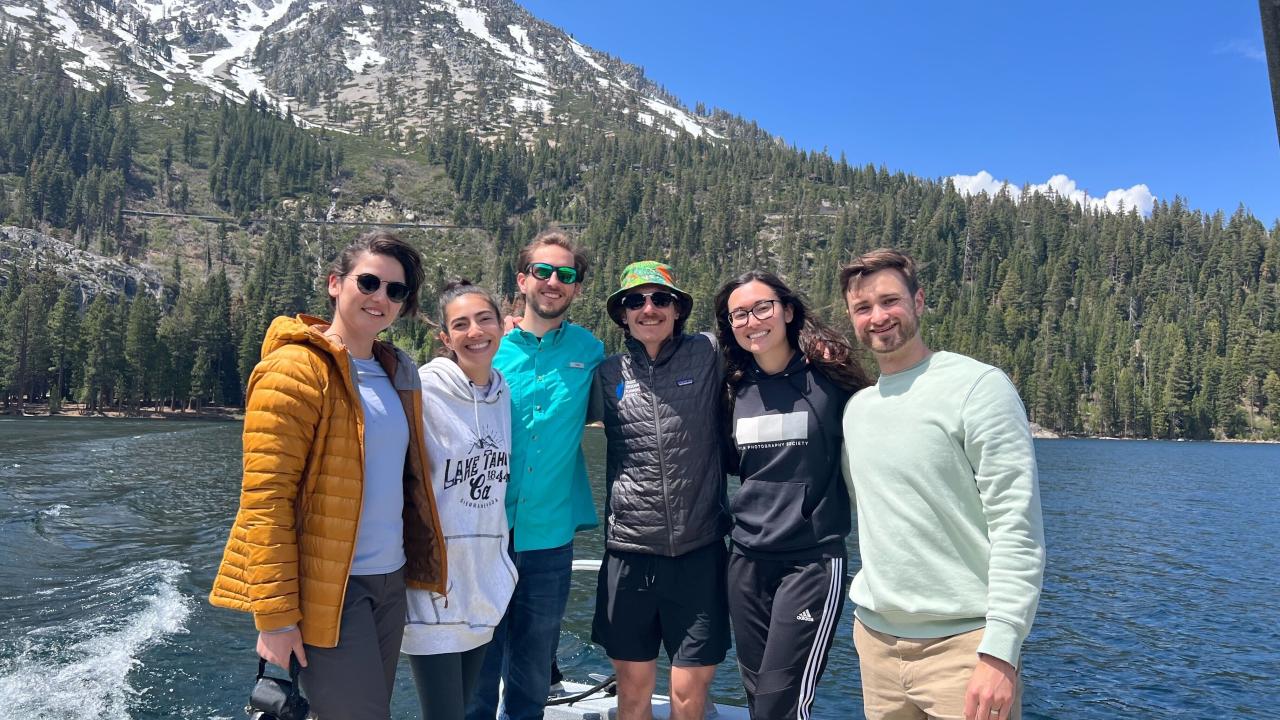
EPM Students Examine Regulatory Code to Support Climate Smart Communities in Tahoe
Quick Summary
- Five Environmental Policy and Management graduate students examined regulatory code changes with the Tahoe Regional Planning Agency, a bi-state regional environmental planning agency, to increase climate resiliency in the Tahoe Basin.

This blog is the fifth in a series of seven, where Environmental Policy and Management students write about the capstone projects they have worked on since January in partnership with external organizations. We want to acknowledge and thank our client, Jacob Stock with the Tahoe Regional Planning Agency for partnering with us on this project.
From the start of our policy clinic project with the Tahoe Regional Planning Agency (TRPA), we have considered ourselves lucky. Our client had a specific target to reach, a general direction for the process, and a set of deliverables to be accomplished. The path was paved; it was now time to begin. Our group – Diana Giraldo, Flor De Maria Rizo, Kamryn Kubose, Michael Macon, and Thomas McNairn – quickly learned that we possessed complementary academic knowledge and work experience which came together seamlessly as we worked to create climate-smart code for the Tahoe Region.
TRPA is working on sustainability-related initiatives in its mission to preserve, restore, and enhance the unique natural and human environment of the region, including a transportation equity study, increased community relationship-building activities, and updates to its Code of Ordinances. We were tasked with developing climate-smart code amendments to achieve the resiliency goals in the 2013 Sustainability Action Plan.
Previous Work
Our project continued the work of Kamryn’s practicum with the Long Range Planning Department at TRPA, where she researched best practices and implementation of climate-smart code from other jurisdictions across the country. She conducted a survey to gauge stakeholders’ level of support, sustainability impact, and feasibility. Her project resulted in a report covering: traffic congestion; energy conservation; energy generation; zero-emissions vehicles; sustainable construction and development; among other pressing issues.
She and TRPA staff presented to the Governing Board in October 2022, who then directed staff to develop regulatory code amendments. Kamryn’s research and the Governing Board’s direction formed the basis for our policy clinic project.
Kicking Off
We began by collecting resources from our client Jacob Stock, senior planner at TRPA, and other TRPA staff members. We used Kamryn’s research, literature from agencies’ websites, and other background information to supplement our understanding of TRPA’s Code of Ordinances.
We then narrowed our scope of work to four priority code topics based on their sustainability impact, feasibility, and Governing Board support. These code topics were: vehicle miles traveled reduction for temporary events, electric vehicle charging infrastructure, solar energy generation, and dark sky standards.
Working Group Meetings
We created an outreach and participation strategy that detailed how and with whom we would engage throughout the outreach process. In coordination with TRPA staff, we developed a list of interested parties, including those involved in implementing TRPA regulatory language, local planners, the US Forest Service, consulting firms, and the Washoe Tribe.
We then conducted three working group meetings in which participants actively workshopped ideas to address each of the four priority topics and provide feedback on the regulatory language. The participants, who held technical knowledge and experiential expertise, helped us identify implementation barriers.
Recommended Code Updates
Our policy clinic team proposed regulatory and policy amendments for our four priority code topics to the TRPA Regional Plan Implementation Committee on May 24, 2023. The Committee welcomed the team’s proposed changes, provided feedback, and offered suggestions. TRPA staff will take our proposed language, make revisions, and complete Regional Plan conformance and environmental review documentation before bringing an amendment package for a formal recommendation to the Governing Board.
